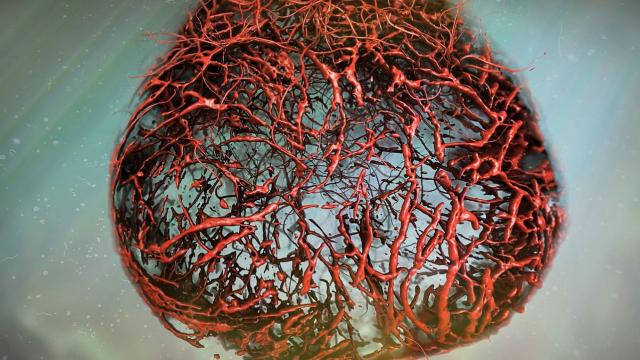An international team of scientists claim to have pulled off a first: Three-dimensional replicas of human blood vessels that are grown in a petri dish. The trippy accomplishment, detailed in a new paper out Wednesday in Nature, will hopefully let us better understand and study crippling diseases like diabetes.
People with diabetes—a condition marked by chronic high blood sugar—often develop poor blood circulation. Heart attacks, stroke, and even limb amputation can eventually happen as a result. Scientists can use animals, including mice, to study the progression of diabetes. But these mouse models don’t capture every aspect of diabetes we see in humans, including how it damages blood vessels.
Ideally, you’d want to see the effects of any disease on something resembling humans as closely as possible. Tiny lab-grown organs, or organoids as scientists call them, have emerged in recent years as a tantalising option to do just that. Up until now though, the researchers behind the current study say, we hadn’t truly recreated human blood vessels in the lab. But the ones made by this research team are “perfect”, according to a University of British Columbia press release.
“Our organoids resemble human capillaries to a great extent, even on a molecular level, and we can now use them to study blood vessel diseases directly on human tissue,” lead author Reimer Wimmer, a postdoctoral researcher at the Institute of Molecular Biotechnology of the Austrian Academy of Sciences (IMBA) in Vienna, said in a statement.
The organoids were grown from stem cells, immature cells capable of turning into more than one type of cell. Just like in people, the replicas were found to have a network of capillaries coated by basement membrane, a kind of connective tissue that helps support and give the vessels structure.
Wimmer and his team went further with their replicas, transplanting them into mice without any immune system (a step that would prevent them from rejecting the donor tissue). The organoids easily took to their new home, connecting to the mice’s native circulatory system, and developed even further into a tree-like network of arteries, small veins, and arterioles (branches of an artery that flow into capillaries).
What’s more, they were even able to recreate “diabetic” blood vessels, characterised by a thickening of the basement membrane. In experiments with mice, and supporting previous research, they found evidence that a signalling pathway involving the protein NOTCH-3 played a key role in creating the thickening seen in blood vessels of people with diabetes. Blocking another protein that targets NOTCH-3, γ-secretase, also seemed to prevent this damage from happening.
The results of these experiments, the researchers say, show that these vessels can be a better model for studying diabetes than traditional mice models. And because of how important our circulatory system is to the rest of the body, the potential for these lab-grown replicas extends far beyond diabetes research.
“Every single organ in our body is linked with the circulatory system,” said senior author Josef Penninger, the founding director of the IMBA and current director of the Life Sciences Institute at the University of British Columbia, in a statement. “Vascular organoids generated from [stem] cells represent a game-changing model — allowing us to unravel etiologies and treatments for a broad spectrum of vascular diseases, ranging from diabetes, Alzheimer’s disease, cardiovascular diseases, wound healing, or stroke, to cancer.”
Blood vessels are only the latest frontier in organoid development. Scientists have already created miniature versions of a stomach, lungs, and even developing brain. These organoids have been used to study the effects of everything from cystic fibrosis to the Zika virus.
